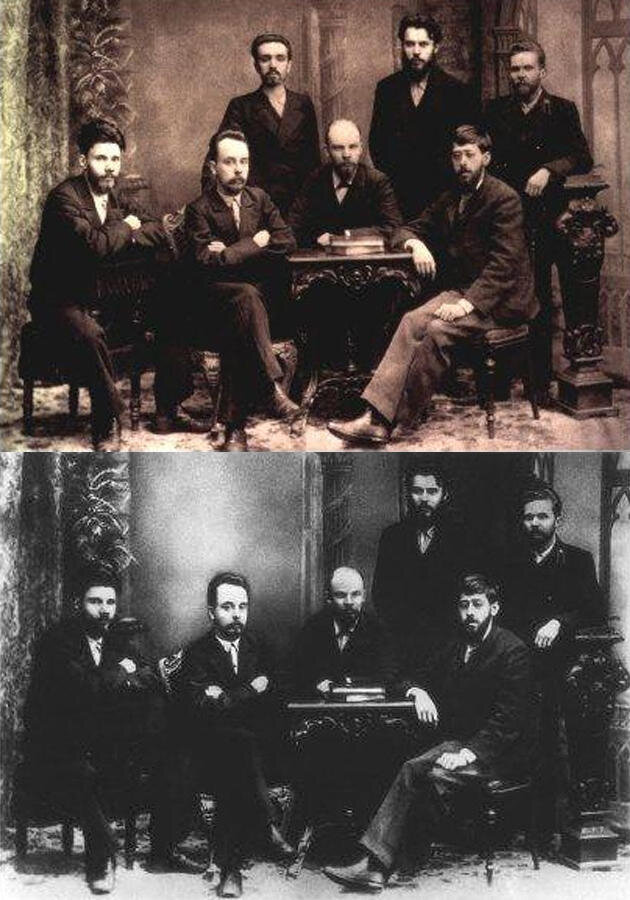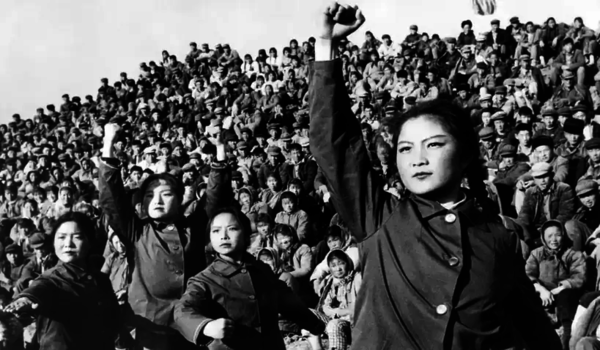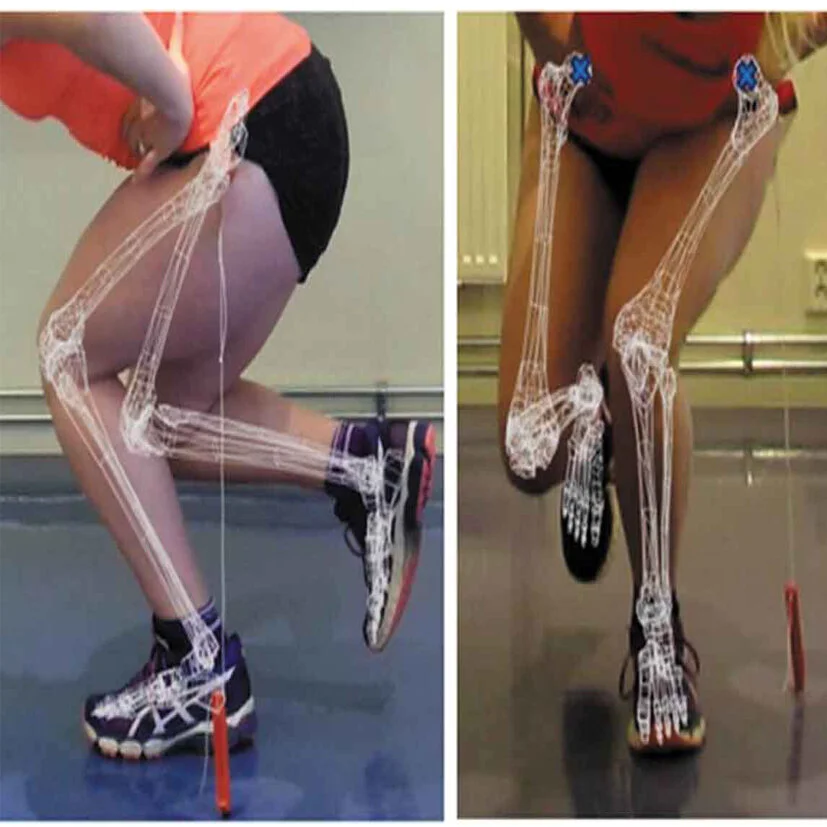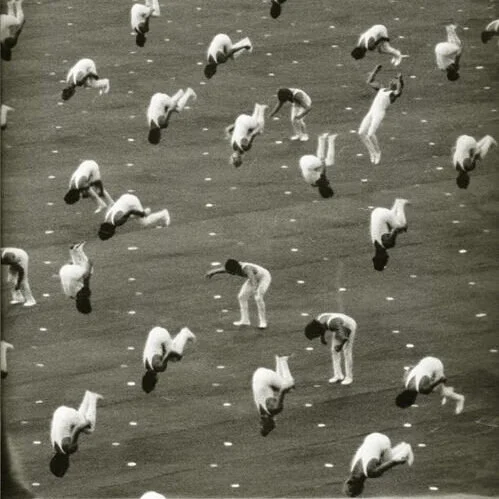Why It’s Hard To Go Against The Grain
I am delusional and gripped by mass hysteria.
This is a sentence no-one is likely to think about themselves; madness resides in others and not ourselves. As humans we have a terrifying capacity to justify ourselves and dig in deeper when our beliefs are questioned.
What are the factors behind this that compel us to follow others and are there consequences to our health if we stand out from the crowd?
The Group Mind
Emotional contagion
We often imagine we are islands, making decisions completely based on our own free will and independent of pressures around us. Time and time again research has shown this to be an illusion, for we are constantly being shaped and reshaped by psychological and social forces.
Emotional contagion is when we take on the attitudes, mood or behaviour of those around us, for instance you feel happier around your cheery Aunt and gloomier after an afternoon spent with Grandad. Whilst we may not feel exactly as they do, the mood of others can rub off on us.
Whilst it’s not entirely clear what mechanisms are driving this, there are currently two concepts that might go some way to explaining this phenomenon :
Mirror Neurons: These fire when a person observes an action performed by someone else and when a person is performing an action themselves - hence the idea of a neuron ‘mirroring’ the behaviour of others.
Facial Feedback Hypothesis: The idea that our facial expression affects our emotional experience.
Professor Sigal Barsade researches emotional contagion and talks about its risks: “One of the things we also know from the research literature is that negative emotions, particularly fear and anxiety, cause us to become very rigid in our decision-making. We’re not creative. We’re not as analytical, so we actually make worse decisions.”
Protect Yourself Against Emotional Contagion
Recognise It Exists
Are you spending too much time online, reading the news or listening to others opinions? Unplug from the source of your anxiety or fear for a day and see if you feel better.
Reduce Media Consumption
We are unnaturally saturated with information, news, information, misinformation, PR and it’s not healthy for us. Interactive media such as Facebook or Twitter are vortexes where hours can be spent scrolling and commenting. Limit the amount of time you spend consuming media.
Make Conscious Choices
A huge amount of people rely on headlines as their source of ‘news’. Instead of choosing social media platforms or media outlets who choose how information in presented, go back to the source. Find citations and go to the source. Whether it’s the CDC, WHO, PHE, scientific papers or scientist’s own websites, primary source material is far less likely to create contagion.
Mass Hysteria
Also known as: mass psychogenic illness, epidemic hysteria, hysterical contagion, psychotic delerium or mass sociogenic illness (take your pick). Mass hysteria is defined as an imagined or assumed threat that causes physical symptoms among a large number of people. This is a strong form of emotional contagion whereby people act irrationally, copying others behaviours based on suggestion or word of mouth.
As Dr. Ariel Mintz explains in his article entitled ‘The Curious Case of Coca-Cola and Mass Hysteria’:
Mass hysteria typically involves vague abdominal and neurological complaints without physical exam findings and occurs in workplaces or schools where people have close contact with each other. All it takes is one person getting sick. Individuals see their colleague falling ill and then worry about getting sick themselves. This is a normal reaction that happens all the time and aside from a little uneasiness, passes by without causing any further harm. However, anxiety can cause our brain to misinterpret regular physiological sensations such as a rumbling stomach and to attribute them instead to illness. In the right conditions, this can lead to hyperventilation and induction of further symptoms
There’s so many curious examples of it in action; here’s a handful of modern cases:
Over 300 people were taken to hospital in Belgium after claiming they fell ill after drinking Coca-Cola. The company withdrew 30 million units from sale after hundreds of complaints. Tests revealed their was nothing out of the ordinary and speculated that anxiety following a recent dioxins scare coupled with widespread coverage of the story, could have caused people to react badly to small amounts of the smell of contamination not in the drink itself.
Emergency services were called after 12 Qantas workers in New Zealand smelt strong smells and suffered from nausea, vomiting, a metallic taste, sore eyes, feeling heavy and having burning throats. In the second incident 3 Qantas workers were taken to hospital. 100 other workers also needed health checks following the incidents. There had been no further reports of incidents at the building, no ongoing health issues with affected staff. A hallmark of psychogenic illness and social contagion was that when people left the site of the assumed toxin they recovered quickly, but then deteriorated if they returned - which had happened when, according to the report, some Qantas staff felt sick again when their clothes were returned to them at hospital.
In October 1965 several girls at a school in the North of England complained of dizziness with some fainting. A couple of hours later, 85 girls were rushed to hospital, having all fainted. An investigation into the incident couldn’t find any external factors that caused the reactions - no air or food pollution. It concluded that it was a case of mass hysteria with potentially two triggering events beforehand - a recent polio outbreak and a parade which resulted in 20 people fainting the day before.
In 1962, 60 workers at a textile factory in America fell ill and blamed the normally harmless june bugs for causing fainting, nausea, numbness, vomiting and dizziness. People thought they had contracted a virus that was transmitted by the bugs in the factory, but the U.S Public Health Service Communicable Disease Center could find no evidence to support this theory.
Gloria Ramirez was in the late stages of cervical cancer and suffering heart problems when she was brought into an American hospital in 1994. The hospital staff tending to her noticed odd particles in her blood and noted their was a strange fruity scent coming from her body. Staff quickly fell ill - 23 in total with 5 of them needing hospitalisation.
Over 4000 students became ill with convulsions, fainting and dizziness in 1990. Initially only a few students at a high school were affected, but the numbers grew and spread over into other schools and cities. People suffered from vision problems as their eyes became inflamed and their faces flushed red. Toxicological reports which analysed blood and urine of patients didn’t contain any poison and nothing was found that could explain the symptoms as having a physical cause.
Pandemics can turn very quickly into mass hysteria because the fear of contracting a virus leads people to panic, furthering the anxiety of those around them (hence the toilet roll shortage). It is a collective state of mind which has the power to influence and convince entire nations of ideas that have no basis in evidence or logic - or of completely overexaggerated risks.
Groupthink
Groupthink can happen when a group of well-intentioned are influenced by a strong urge to conform and make irrational or non-optimal decisions. The desire for group harmony can be so strong that it overrides people’s ability to criticise or point out the problems - like swimming against the tide.
When a group reaches a consensus without evaluation of the consequences or using critical reasoning then it can be defined as groupthink. This can result in decisions being made that are irrational and logical alternatives overlooked or ignored in favour of keeping everyone happy. The worst thing would be to upset the status quo by speaking out against it. This soon creates an atmosphere where self-censorship flourishes and people’s opinions are stifled to reduce or avoid conflict. Organisations and businesses can be especially vulnerable to this due to the hierarchy of people within it and some people holding greater weight and influence than others.
The Encyclopedia Britannica explains the domino effect of Groupthink:
Decision making affected by groupthink neglects possible alternatives and focuses on a narrow number of goals, ignoring the risks involved in a particular decision. It fails to seek out alternative information and is biased in its consideration of that which is available. Once rejected, alternatives are forgotten, and little attention is paid to contingency plans in case the preferred solution fails.
Signs Of Groupthink
The illusion of invulnerability and the inability to be wrong
Stereotyping of others who don’t share the same beliefs
The collective rationalisation of the group’s decisions
An unquestioned belief in the morality of the group and its choices
Gatekeepers who act as barriers to alternative or negative information
Self-censorship
The illusion of complete agreement of a course of action
Protect Yourself Against Groupthink
Play Devil's Advocate
Appoint yourself as the devil's advocate, or if you are in a leadership position, appoint someone else to play this role. This can help to ensure problems are discussed and accounted for early on in the planning stages.
Encourage Anonymous Feedback
This allows people to offer suggestions and feedback that they may not feel comfortable doing in front of a group. It helps uncover issues that people may be thinking of but unwilling to say out loud.
Challenge The Consensus
Ask people to give reasons why they agree with the consensus - this can help articulate arguments or expose the fact people don’t have any reasons at all except they are going along with the majority. This also creates the space to discuss things fully and shine a light on areas that may be overlooked.
‘Groupthink is becoming a national philosophy. We are not talking about mere instinctive conformity - it is, after all, a perennial failing of mankind. What we are talking about is a rationalized conformity - an open, articulate philosophy which holds that group values are not only expedient but right and good as well.’
- William Whyte
Herd Mentality
Social influence is a powerful force in nature and society - if everyone around you suddenly starting running in one direction, you would run too. We are social creatures and defined by others - our ideas, values and view of the world are largely shaped by the society we are born into and we draw much of our individual self-esteem from our sense of belonging, whether that’s a family, friend group or neighbourhood. Anyone who has spent time in another country without understanding the language or customs will recognise the feeling of being a different version of yourself in an alien situation.
We are all influenced by how others around us behave and we adopt certain behaviours based on an emotional, rather than rational, basis. We may even make different decisions when in a group than we would individually. This seems to be a throwback to our past, when reacting collectively meant survival.
Herd mentality is defined as the tendency for our behaviour or beliefs to conform to those of the group which we identify with the most. We naturally want to fit in, so herd mentality is difficult to avoid because copying others is so ingrained within us.
The challenge is to be able to weigh up the validity of your own beliefs against others which contradict your own. Studies seem to suggest that we have evolved to over-use social information, and copy others too much more than we should.
Protect Yourself Against Herd Mentality
Move Out Of Autopilot
Make the effort to check-in with yourself and consider the part you’re playing in a situation. It’s easy and efficient for us to respond automatically and go along with things because everyone else is.
Don’t Make Decisions When Emotions Run High
Heightened emotions narrow our focus and prevent us from seeing the bigger picture. Take the time to make decisions - rushing to consensus is a bad sign.
Listen To Other Sides Of The Story
We are increasingly finding ourselves closed off in echo chambers and surrounded by people with extremely similar views to our own. Skeptics and radical thinkers can offer alternative views and are not afraid to speak out with a unique opinion and are useful for highlighting blind spots.
‘Men, it has been well said, think in herds; it will be seen that they go mad in herds, while they only recover their senses slowly, one by one.’
- Charles MacKay
The Sunk Cost Fallacy
Our decisions are tainted by the emotional investments we accumulate - the more time, money, and energy we invest into something, the harder it is for us to abandon it when things didn’t go to plan. The longer this goes on, the harder it becomes to let go because the sunk cost blinds us from considering better alternatives and we irrationally continue onwards with the belief things will improve. Hence the name ‘sunk cost’- the ship has already sunk and you can’t change that fact, all you can change is how you react to it.
Consider some examples:
Staying in a relationship too long before leaving- the longer you’ve been together, the harder it is to break up.
Continuing doing a course you’ve paid for even though it is nowhere near as good as you expected it to be for the money you paid.
Keeping things you spent a lot of money because they were expensive and you want to justify why you bought them.
Watching a film the whole way through even though it was awful.
The main driver of the sunk cost fallacy is loss aversion - the idea we feel more pain when we lose something than we feel happy when we gain something of an equal value - studies show that losses are psychologically twice as powerful as gains. The dilemma is that it can be unbearable for an organisation or a person to accept their initial course of action was incorrect and the urge to save face outweighs the damage caused by continuing on the same path - even if it ends up with more losses in the long-term.
Protect Yourself Against T
he Sunk Cost Fallacy
You Are Allowed To Make Mistakes
Learn to become ok with making mistakes and understand their will be fear involved. It is our willingness to embrace and learn from our mistakes that creates the possibility of making better and more informed decisions.
Ask The Right Questions To Get the Right Answers
Am I making this decision based on fear and avoidance of possible pain?
If yes, what are they?
What are the worst-case scenarios?
What is my emotional state when I’m making this decision?
Does this decision align with my long-term goals?
How will this make my present or future better?
Become Aware Of You Behaviour
Get into the habit of reviewing the important events of your day. Walk through the things that happened and you might notice that there were a few situations that didn’t go as you might have wanted them to. If so, use this time to re-imagine the circumstance, as if it had turned out just as you wanted it to go.
‘It is becoming more and more obvious that it is not starvation, it is not microbes, it is not cancer, but man himself who is the greatest danger: because he has no adequate protection against psychic epidemics, which are infinitely more devastating in their effect than the greatest natural catastrophes.’
- C. G. Jung
Health-Related Consequences Of Going Against The Grain
The Physiology of Shame
We’ve all experienced shame at some point in our lives; embarrassment, fear, shyness, anger, rage, anxiety, envy and these emotions are indicated through experiences in the body. Dr. Brené Brown notes that ‘the difference between shame and guilt is the difference between ‘I am bad’ and ‘I did something bad’. It is this internalising of emotions that can have such long-lasting and devasting outcomes - we’re not meant to stay stuck in the fight-flight-or-freeze response for long periods of time. This physiological response is connected to the sympathetic nervous system and is our survival mode. There are many consequences of this and the body will prioritise mechanisms that keep us alive in the immediate moment whilst everything else is put on the back burner - suppressing the immune system, pain and healing for a later date. Only when we leave that state does the parasympathetic nervous system allows us to rest, recover, and digest nutrients properly.
Psychosocial Stress
Psychosocial stress is stress experienced as a result of our social interaction with others. There are three generalised situations which causes psychosocial stress:
Social evaluation (being judged by others)
Social exclusion (being rejected by others)
Goal-oriented situations (having your performance judged by others)
Stress triggers a cascade of actions which include the release of cortisol, epinephrine (or adrenalin), and dopamine that lead to a burst of energy and subsequent come down. These changes are useful in the short-term but very damaging in the long time - cortisol can improve the body’s functioning by increasing available energy but can lead to suppression of the immune system. Psychosocial stress causes symptoms which can either be temporary (acute) or persist for a long period of time (chronic) such as:
Sweating
Elevated blood pressure
Rapid heartbeat
Dizziness
Nausea and digestive problems
Depression
Drug or alcohol abuse
Social Isolation
Loneliness - another term for social isolation - poses a serious health risk and our bodies elicit a strong physiological response to it. Numerous studies show the unexpected and far-reaching effects of being alone including increasing the risk of cardiovascular disease, blood pressure and cholesterol, as well as impairing immune function and increasing chronic inflammation - putting us at a higher risk of developing all kinds of illnesses and diseases.
Loneliness has the same impact on mortality as smoking, making it even more dangerous than obesity. In a study which measured brain activity during sleep, people who identified as lonely were far more prone to micro-awakenings throughout the night. It was speculated that this might be connected to our good old primal brain, keeping us safe and alert to threats during the night if we were unable to be in the safety of our tribe.
We are social mammals and need to be around other people in order to survive; the presence of others means protection and support. This wiring hasn’t left us just because we live in the modern age of hyper-convenience where we can lock ourselves away from the world and buy everything online. The feeling of ‘being left out in the cold’ triggers a powerful response because being pushed out of a tribe meant certain death.
‘Emergencies have always been the pretext on which the safeguards of individual liberty have been eroded - and once they are suspended it is not difficult for anyone who has assumed such emergency powers to see to it that the emergency will persist.’
- Friedrich Hayek
why is this even relevant to me?
Because It’s All Just A Little Bit Of History Repeating
Democratic government is legitimised by the consent of those it governs; the more a society censors, blacklists and blocks free speech and the free flow of information, the more disaffected people become. Whilst it’s not worth catastrophising and thinking of the worst that can happen it’s also everybody’s civic duty to be aware any society of country can succumb to repression, whatever their history.
Totalitarianism can be seen as a government becoming more and more intrusive, exercising control and directing every aspect of a person’s life. For this to happen, two preconditions must be present. The first is that people are dissatisfied enough with the status quo to want it to change - often quickly and radically. The second is the constant use of manipulation of information via propoganda (through the main mediums of the time).
It’s very difficult to distinguish a benign mass movement from a totalitarian regime initially because all totalitarian regimes begin in mass movements. Mass movements are characterised by people wanting a change in their personal or social circumstances which is why they thrive in cultures that are socially isolated, lonely and disaffected because they offer them a sense of meaning, camaraderie and identity.
Anyone who isn’t doing well in a society, or is blocked by prejudice or lack of opportunity will be drawn to other ways of organising a society. This isn’t bad in itself; it is the fact that no regime advertises itself as totalitarian yet attracts people whose main drive is to create the conditions for a better life for themselves and their family.
After Bingeing Comes Purging
A purge is when people who are considered undesirable are removed from their position in society; this can be non-violent (such as being banned from social media) or violent (imprisonment, exile or execution). It is an effective technique to show people what will happen if they overstep the boundary that has been put in place and plays on peoples desire to conform and be accepted. In a political purge, States or elites use military and police forces to remove people they consider disloyal, dangerous, or otherwise undesirable from influential positions in government, the economy or from society as a whole.
The problem with purges is that they run counter to freedom of expression and often grow ever more ruthless. When the Bolshevik’s seized power in Russia in 1917 they claimed they would create a utopia for the proletariat (the working class). Instead of moving towards shaping Russia to become a republic or even a direct democracy like Switzerland, all the other political parties were expelled and, when Stalin took control in 1922, his reign was characterised by endless paranoid purges of his rivals and, eventually he turned on his Bolshevik contemporaries. When the government is built on lies it’s best to not trust anyone.
Struggle Sessions | A Forerunner of Cancel Culture
Public shaming is one of the most effective ways to keep people in line and this was elevated to a terrifying art during the Cultural Revolution in China in the 1960s with the creation of struggle sessions. These struggle sessions were held in stadiums, town halls or workplaces and the accused would be forced to admit various crimes - often from mere accusations or allegations - whilst mob justice was enacted verbally or physically.
The crimes were often thought-crimes such as believing in traditional values, not venerating Chairman Mao or plain ignorance of current accepted beliefs. Some estimate that around 700,000 people were persecuted in struggle sessions with 34,000 of dying from them.
‘Sweep away all monsters and demons,’ an editorial in the Chinese Communist party’s newspaper People’s Daily read on June 1st, 1966. ‘Smash the bourgeois ‘specialists,’ ‘scholars,’ ‘authorities,’ and ‘venerable masters.’’ The article continued, urging people to destroy ‘The Four Olds:’ ideas, cultures, customs and habits that it has said had been fostered by the exploitative rich to poison the minds of the people. What they wanted was a new normal.
Antonio Gramsci, a Marxist who saw that political revolution would be impossible without cultural revolution saw his ideas reach their zenith with Chairman Mao. He enabled the Chinese youth to form Red Guards who initiated mass purges as they waged a war against the ‘bourgeoisie’. Young people in military uniforms and red armbands dragged their teachers and their neighbors into the streets and publicly beat, humiliated and sometimes tortured them to death them in an attempt to eradicate the past. They destroyed statues, temples and relics in order to bring China into a new age free of old ideas in the ‘great leap forward’.
‘In my study of communist societies, I came to the conclusion that the purpose of communist propaganda was not to persuade or convince, not to inform, but to humiliate; and therefore, the less it corresponded to reality the better. When people are forced to remain silent when they are being told the most obvious lies, or even worse when they are forced to repeat the lies themselves, they lose once and for all their sense of probity. To assent to obvious lies is in some small way to become evil oneself. One’s standing to resist anything is thus eroded, and even destroyed. A society of emasculated liars is easy to control.’
- Theodore Dalrymple
Democide
Democide is the murder of any person or people by their government including politically motivated assassinations, mass murder or genocide. Rudolph Joseph Rummel (1932-2014) coined the word to cover actions that were being taken by governments not covered by the term ‘genocide’. A professor of political science, he taught at the Indiana University, Yale University, and University of Hawaii and spent his career studying data on collective violence and war with a view toward helping their resolution or elimination. He wrote 6 books on the subject, publishing his information and statistics as a free resource on his website and his conclusions were based on empirical study over a period of 15 years.
Statistics
Communist China under the stewardship of Mao Zedong holds the ignoble honor of being the most democidal regime in human history to the tune of 65 million people killed, including 30 million during the Great Leap Forward alone.
Second is the Soviet Union, with 61 million deaths which includes 7 million people who died in the Holodomor (a man-made famine in Soviet Ukraine from 1932 -1933).
Hitler comes in third with official estimates of the total dead ranging from 15 million to 20 million.
Between 1900-1987, 46.6% of the deaths that have occurred in China can be attributed to democide.
5 different regimes are believed to have killed more than 10 million people. Two of those regimes are based in China.
Rwanda joined the 1 million murder democide club in just 4 months of being in power.
The UK is believed to be responsible for 816,000 democide deaths since 1900.
Total number of people killed by democide since 1900: 242 million.
Rummerl writes - ‘In sum the communists have probably murdered something like 110,000,000, or near two-thirds of all those killed by all governments, quasi-governments, and guerrillas from 1900 to 1987. Of course, the world total itself it shocking. It is several times the 38,000,000 battle-dead that have been killed in all this century’s international and domestic wars.’
He came to the conclusion that the less liberal democracy and the more totalitarian a regime, the more likely it will commit democide. The closer to absolute power, the more a regime’s disposition to murder one’s subjects or foreigners multiplies.
‘The welfare of the people in particular has always been the alibi of tyrants, and it provides the further advantage of giving the servants of tyranny a good conscience.’
- Albert Camus
Conclusion
The way we choose to act is heavily weighted towards what others around us are doing and what society considers acceptable. We suffer both physically and mentally from going against the crowd because it violates our instincts to stay alive in a tribe and cooperate. Living in the modern world has distorted our natural instincts and, even though we are surrounded by people, their values and actions may not be inline with ours. Our reality is shaped by others through the media and they have the ability to create and shape opinion and perception - if a large majority of people are in agreement about something, then it might be right. The problem is that this desire to fit in to the crowd can be leveraged against us and we can end up being drawn into groupthink or mass hysteria which leaves us vulnerable to making terrible decisions.
There are many threads that have led to this point in time, many small and large decisions taken by those we know and those we don’t. Whatever that path has been, we’re standing here in 2020 - supposedly at the peak of human existence - and yet unable to distinguish feeling and thinking. Unable or unwilling to question information presented to us, because it is coming from an ‘authority’. As I said in a previous post, our feelings are not guideposts on how to act. They tell us nothing about what is right and wrong and we cannot live ethical, morally driven lives if we live under the dictates of emotions, especially when these emotions can be transmitted so easily from other people.
We look back smugly at those in the past who behaved in a certain way and think, ‘I’d never have done that, I’d definitely have stood up to tyranny, oppression and fought for freedom’. The sad truth is you most likely wouldn’t have; you would have gone along with it because it was cloaked in reasons why - such as convenience, comfort, shame, humiliation or the strong primal urge to be part of the crowd. History has shown us that it is people occupying positions of authority who use it to their advantage. When civic righteousness is defined as blind adherence to guidelines and rules then tyranny isn’t far away. For those of you comfortably assured that this could never happen because their are inherent checks and balances, think again. The statistics of Democide show how much violence was legally sanctioned; people were officially sent to the gulag and concentration camps, alongside their paperwork and files.
We rely on Parliamentary Democracy to protect us from an unchecked Executive, this isn’t happening at the moment and it is up to every one of us to do our civic duty to question these massive restrictions on freedom which are being forced upon us without following the usual legal processes. History has shown us that regimes operate under the cover of protecting their citizens from an external harm and there is currently no end point to rolling back these ‘unprecedented’ powers.
If we are being asked to put our lives and businesses on hold for the foreseeable future, we need to be given the statistics, data and evidence to support these restrictions of our basic freedoms. We need to see the justification of such a response alongside the cost/benefit analysis conducted before going ahead with such measures. There needs to be a clear plan that takes into account all healthcare, the economy, business, education and quality of life. Time will tell if the lockdown restrictions kill more people than the virus has, and we need to ask what is the point of ‘protecting’ someone from Covid-19 if they are killed off from destroying their livelihood, a lack of access to healthcare or even through suicide. Democratic freedom and individual wealth and prosperity are closely linked - this freedom also saves millions of lives from famine, disease, war, collective violence, and democide. The more freedom, the greater the human security and the less the violence and, conversely, the more power governments have, the more insecurity, poverty and violence there is.
We’ve seen that whenever the perception of risk increases, the feelings and anxiety around our risk also increases, even if there is no actual increased risk involved. We are more frightened of a virus than we are of diabetes, obesity and driving a car - we consider those risks worth taking, despite them carrying the potential to cause us harm. We downplay obvious risks such as life-style related diseases that we have near complete control over and choose to focus on things outside our control, reinforcing our powerlessness.
Smoking, drinking alcohol, eating junk food, driving, being unfit, being obese are choices we make yet it seems we live in a world where the primary purpose of life is extending it as long as possible, at any cost. The flip side of this is the absolute avoidance of death and the outrage even our institutions can’t save us from it. Every person has to be free to make a cost-benefit analysis for everything they do, because ultimately, that’s what life is - a calculated risk. It is completely impossible to eliminate risk altogether, and why would you want to - all the things that give your life joy and meaning contain some of it.
‘Following Orders means doing what you are told to do, without judging for yourself whether or not the action you are being ordered to carry out is Right or Wrong.
If an individual is following orders, that individual cannot be exercising Conscience, since, by definition, exercising Conscience means that one is willfully choosing for themselves Right Action over Wrong Action.
"I was just following orders" is never a valid excuse or "justification" for immoral, criminal behavior, and this lame attempt to abdicate personal responsibility should never be accepted as a valid excuse for such behavior.’ - Mark Passio
Photograph: Anton Dostler was one of the first German's to be found guilty of war crimes in 1944 and used what later came to be known as the Nuremberg defence. This was the idea that someone couldn't be found guilty for actions they committed that were ordered by an official or superior.
He's photographed being tied to a stake before being shot by a United States Army firing squad.
‘The only thing necessary for the triumph of evil is for good men to do nothing.’
- Edmund Burke
APPENDIX
An opinion polling company – Kekst CNC – reported that Scottish people believe that 10.23% of the UK population have died from Covid-19, which equates to about 7 million people. Scotland itself is populated with only about 5.4 million people. The company also asked English people and women believed 9.91% of the UK population have succumbed to the virus whilst men are a little more cheery, believing that 3.45% of the population has died. To put these figures into perspective; the current death toll is 0.3% of the UK population.
Average age of Covid
deaths for 10 countries:
- Austria 80 (EMS)
- Canada 86 (HCSC)
- England 80 (NHS)
- France 84 (SPF)
- Germany 82 (RKI)
- Italy 81 (ISS)
- Spain 82 (MDS)
- Sweden 86 (FOHM)
- Switzerland 84 (BAG)
- United States 80 (CDC)
Biderman’s chart of coercion
A tool designed to demonstrate and explain coercive methods of stress manipulation used to torture prisoners of war. It has been applied to explain the coercive techniques used by perpetrators of domestic abuse.
Questions to Ponder
Consider the following questions and their implications:
Are you told where you are allowed to go?
Are you told who you can meet?
Are you banned from gathering with other people?
Is the Government tracking your whereabouts?
Are certain opinions and views not represented in public discourse?
Do the media provide unbiased reporting or are they creating a narrative?
Do the media question the decisions of those in Government?
Are you encouraged to inform on friends or neighbours if they’re ‘breaking the rules’?
Have you been shamed privately or publicly for expressing views counter to the ‘official’ ones?
Are relevant statistics given context and explained adequately?
How much of the economy and the monetary system is controlled by the state compared to free enterprise?
August 26th: The CDC updated it’s information and now reports that 6% of all the 153,504 deaths recorded in the USA died from Covid-19 alone - that’s 9,210 deaths. The other 94% had 2-3 other serious illnesses and the overwhelming majority were of very advanced age; 90% of them were in nursing homes.
Prof. Udi Qimron head of the Department of Clinical Microbiology and Immunology at Tel Aviv University was recently interviewed about Covid-19 and it’s clear that the sunk cost fallacy has affected many Politicians decisions:
“There is a very great interest for anyone who has supported the draconian measures taken around the world to say that Sweden’s policy has failed. Because if it succeeded, and trillions went down the drain for no reason, someone will have to answer for it. That is why all over the world they prefer to claim that Sweden was wrong. But in the end, the truth came to the surface. In a world where decision makers, their advisers and the media were able to admit their mistake and the initial panic that gripped them, we would have long since returned to routine. The ongoing destruction due to the inability to admit this mistake, despite the epidemic’s small mortality numbers, is outrageous. History will judge the hysteria.”
They Thought They Were Free
The Germans, 1933–45
Germans were kept in a state of constant change - a technique Hannah Arendt later described as the ‘perpetual-motion mania of totalitarian movements [that] remain in power only so long as they keep moving and set everything around them in motion.’
“What happened here was the gradual habituation of the people, little by little, to being governed by surprise,” Mayer was told. The Nazi dictatorship was ‘diverting,’ he said, in that it kept people “so busy with continuous changes and ‘crises’ and so fascinated…by the machinations of the ‘national enemies’ without and within, that we had no time to think about these dreadful things that were growing, little by little, all around us.”
The broader pattern of constant societal change that totalitarianism imposed had a profound effect on individual agency. It resulted in a kind of personal inertia, even when one had an inkling of what was being set in motion. Things kept getting worse, but people struggled to react properly, or convince others that they should be worried, too.
“In your own community, you speak privately to your colleagues, some of whom certainly feel as you do; but what do they say? They say, ‘It’s not so bad’ or ‘You’re seeing things’ or ‘You’re an alarmist,’” he explained. “And you are an alarmist. You are saying that this must lead to this, and you can’t prove it. Each act, each occasion, is worse than the last, but only a little worse, you wait for one great shocking occasion, thinking that others, when such a shock comes, will join with you in resisting somehow.” But that moment never came. “That’s the difficulty, if the last and worst act of the whole regime had come immediately after the first and smallest, thousands, yes millions would have been sufficiently shocked… But of course this isn’t the way it happens. In between come all the hundreds of little steps, some of them imperceptible, each of them preparing you to not be shocked by the next. Step C is not so much worse than Step B, and, if you did not make a stand at Step B, why should you at Step C? And so on to Step D.”
“That’s the difficulty. The forms are all there, all untouched, all reassuring, the houses, the shops, the jobs, the mealtimes, the visits, the concerts, the cinema, the holidays. But the spirit, which you never noticed because you made the lifelong mistake of identifying it with the forms, is changed. Now you live in a world of hate and fear, and the people who hate and fear do not even know it themselves, when everyone is transformed, no one is transformed. You have accepted things you would not have accepted five years ago, a year ago, things your father…..could never have imagined.”
“It is hard to imagine a more stupid or more dangerous way of making decisions than by putting those decisions in the hands of people who pay no price for being wrong.”
Covid-19: Politicisation, ‘Corruption,’ And Suppression Of Science
written by Kamran Abbasi, executive editor of The British Medical Journal
Politicians and governments are suppressing science. They do so in the public interest, they say, to accelerate availability of diagnostics and treatments. They do so to support innovation, to bring products to market at unprecedented speed. Both of these reasons are partly plausible; the greatest deceptions are founded in a grain of truth. But the underlying behaviour is troubling.
Science is being suppressed for political and financial gain. Covid-19 has unleashed state corruption on a grand scale, and it is harmful to public health. Politicians and industry are responsible for this opportunistic embezzlement. So too are scientists and health experts. The pandemic has revealed how the medical-political complex can be manipulated in an emergency – a time when it is even more important to safeguard science.
The UK’s pandemic response provides at least four examples of suppression of science or scientists. First, the membership, research, and deliberations of the Scientific Advisory Group for Emergencies (SAGE) were initially secret until a press leak forced transparency. The leak revealed inappropriate involvement of government advisers in SAGE, while exposing under-representation from public health, clinical care, women, and ethnic minorities. Indeed, the Government was also recently ordered to release a 2016 report on deficiencies in pandemic preparedness, Operation Cygnus, following a verdict from the Information Commissioner’s Office.
Next, a Public Health England report on Covid-19 and inequalities. The report’s publication was delayed by England’s Department of Health; a section on ethnic minorities was initially withheld and then, following a public outcry, was published as part of a follow-up report. Authors from Public Health England were instructed not to talk to the media. Third, on October 15th, the editor of the Lancet complained that an author of a research paper, a UK Government scientist, was blocked by the Government from speaking to media because of a “difficult political landscape”.
Now, a new example concerns the controversy over point-of-care antibody testing for Covid-19. The Prime Minister’s Operation Moonshot depends on immediate and wide availability of accurate rapid diagnostic tests. It also depends on the questionable logic of mass screening – currently being trialled in Liverpool with a suboptimal PCR test.
The incident relates to research published this week (November 2020) by the BMJ, which finds that the Government procured an antibody test that in real world tests falls well short of performance claims made by its manufacturers. Researchers from Public Health England and collaborating institutions sensibly pushed to publish their study findings before the government committed to buying a million of these tests but were blocked by the health department and the prime minister’s office. Why was it important to procure this product without due scrutiny? Prior publication of research on a preprint server or a government website is compatible with The BMJ’s publication policy. As if to prove a point, Public Health England then unsuccessfully attempted to block The BMJ’s press release about the research paper.
The UK’s pandemic response relies too heavily on scientists and other Government appointees with worrying competing interests, including shareholdings in companies that manufacture Covid-19 diagnostic tests, treatments, and vaccines. Government appointees are able to ignore or cherry pick science – another form of misuse – and indulge in anti-competitive practices that favour their own products and those of friends and associates.
How might science be safeguarded in these exceptional times? The first step is full disclosure of competing interests from Government, politicians, scientific advisers, and appointees, such as the heads of Test and Trace, diagnostic test procurement, and vaccine delivery. The next step is full transparency about decision making systems, processes, and knowing who is accountable for what.
Once transparency and accountability are established as norms, individuals employed by government should ideally only work in areas unrelated to their competing interests. Expertise is possible without competing interests. If such a strict rule becomes impractical, minimum good practice is that people with competing interests must not be involved in decisions on products and policies in which they have a financial interest.
Why I quit rather than be silenced: Sanjeev Sabhlok
Last week I quit my job as an economist in the Victorian Department of Finance and Treasury so that I would be free to speak out against the state’s management of the COVID-19 infection. I had made a number of criticisms of the state government on social media. The head of human relations at Treasury asked me to remove them. I considered deleting the few direct criticisms, but they wanted all indirect criticism removed too. I resigned on the same day, the only honourable course for a free citizen of Australia. I never dreamed I would see some of the tactics being used to defend the state’s health.
The pandemic policies being pursued in Australia – particularly in Victoria – are the most heavy-handed possible, a sledgehammer to kill a swarm of flies. These policies are having hugely adverse economic, social and health effects, with the poorer sections of the community that don’t have the ability to work from home suffering the most. Australia is signalling to the world that it is closed for business and doesn’t care for human freedoms. This will dampen business investment but also impact future skilled migration, the education industry and tourism. The need for good policy process does not disappear just because we face a public health crisis. In fact, it gets even more urgent.
The Victorian Guide to Regulation notes that “It is not possible for governments to provide a completely ‘risk free’ society, or to prevent every possible event that might cause harm”. Further: “The direct and indirect costs imposed by regulatory approaches may not be … immediately obvious. Risk regulation that is poorly targeted or costly will divert resources from other priorities.”
Governments back in February needed to commission a cost-benefit analysis of alternative policy options that took into account different scenarios (such as with and without a vaccine). Thereafter, the best option had to be picked given the uncertainty, but consistent also with the need to intrude minimally into human freedoms. This cost-benefit analysis and policies needed then to be updated as new information emerged (such as the fact that epidemiological models have badly exaggerated the risk).
Governments should have also realised at the outset that they are hostage to chronic groupthink and actively sought alternative advice. I attempted repeatedly to raise my voice within my public sector role, but my attempts were rebuffed. The bureaucracy has clamped down on frank and fearless, impartial advice, in a misplaced determination to support whatever the government decides, (instead of performing its taxpayer-funded duty of providing forthright analysis of alternatives).
While there is scientific argument against lockdowns, there are divergent views on matters such as the effectiveness of masks. I am a mask fanatic but there was never any reason to mandate these debatable requirements. Voluntary, performance-based rules would allow the private sector to innovate, leaving people with the power of agency, to determine their own fate – thereby minimising economic harm, and harm to mental health and general well-being.
So what happens now? Billions of dollars in income and wealth have been wiped out in the name of a virus that is no worse than the Asian flu and which can (even now) be managed by isolating the elderly and taking a range of voluntary, innovative measures. All the border closures, all the lockdowns, all the curfews in Melbourne will not eradicate the virus from planet Earth.
Social Disconnectedness, Perceived Isolation, and Health among Older Adults
Social Relationships and Mortality Risk: A Meta-analytic Review
Loneliness, health, and mortality in old age: A national longitudinal study
Loneliness matters: a theoretical and empirical review of consequences and mechanisms
Social Relationships and Mortality Risk: A Meta-analytic Review
Loneliness, health, and mortality in old age: A national longitudinal study
Social information use and the evolution of unresponsiveness in collective systems
Loneliness and health: potential mechanisms
Amnesty International UK Press release
Statistics Of Democide, Why Democide? Explanation And Proof* R.j. Rummel
Death By Government, R.j. Rummel, New Brunswick, N.j.: Transaction Publishers, 1994
COVID-19 emergency measures and the impending authoritarian pandemic
Reported Cases and Deaths by Country, Territory, or Conveyance of Covid-19
The Virus in the Age of Madness
The Origins of Totalitarianism
The True Believer: Thoughts on the Nature of Mass Movements
The Martians Have Landed: A History of Media-Driven Panics and Hoaxes
Life After The State
Researcher and attorney Michael P. Senger: ‘This thread is for the victims of lockdown, the greatest crime of the 21st century.’
China Covid-19: The Chimera That Changed The World
Covid-19: We will not be returning to the old normal
If the only penalty for a crime is a fine, then it is only illegal for the poor
COVID-19 Vaccine Messaging, Part 1
Covid-19 Vaccine Protocols Reveal That Trials Are Designed To Succeed
18 Reasons I Won’t Be Getting a Covid Vaccine
Covid-19: Politicisation, ‘Corruption,’ And Suppression Of Science
Ensuring Uptake of Vaccines against SARS-CoV-2
China’s Global Lockdown Propaganda Campaign
Should spreading anti-vaccine misinformation be criminalised?
Why I quit rather than be silenced: Vic Treasury insider
Peer review: a flawed process at the heart of science and journals
A 1493% Rise in the incidence of Abusive Head Trauma during the COVID-19 pandemic
Assessing Mandatory Stay‐at‐Home and Business Closure Effects on the Spread of COVID‐19
Never has so few cost so many so much
Some corporations are cashing in on Covid-19 on behalf of the wealthiest
Bystander at the Switch: The Moral Case Against COVID Lockdowns
UK Influenza Pandemic Preparedness Strategy
Swine flu of 1976: lessons from the past
UNICEF release announces child labour rises to 160 million – the first increase in two decades
Gov. Ron DeSantis Holds Public Health Roundtable Discussion in Tallahassee
The Ten Stages of Genocide By Gregory H. Stanton, President, Genocide Watch
The Anti-science Movement Is Escalating, Going Global and Killing Thousands
According to ONS data there was a total of 9400 deaths in 2020 that were due to Covid-19 and were recorded without any pre-existing conditions. 1549 people between the ages of 1-64 years died
Quarter of Covid deaths not caused by virus, new figures show
Seven Peer-Reviewed Studies That Agree: Lockdowns Do Not Suppress the Coronavirus
Lockdown ‘had no effect’ on coronavirus pandemic in Germany
Lockdowns are ‘the single biggest public health mistake in history’, says top scientist
Make-A-Wish refuses to grant wishes to unvaccinated children
Lisbon court rules only 0.9% of ‘verified cases’ died of COVID, numbering 152, not 17,000 claimed
Time to assume that health research is fraudulent until proven otherwise?





































































What are the most common misconceptions about furniture free? Well these are my top three!